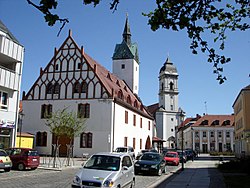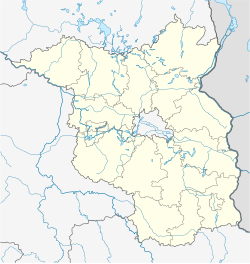Fürstenwalde/Spree (German pronunciation: [ˈfʏʁstn̩ˌvaldə] ; Lower Sorbian: Pśibor pśi Sprjewje [ˈpɕibɔr ˈpɕi sprʲɛwʲɛ])[3] is the most populous town in the Oder-Spree District of Brandenburg, in eastern Germany.
Fürstenwalde/Spree | |
|---|---|
 Town hall and Cathedral | |
Location of Fürstenwalde/Spree within Oder-Spree district  | |
| Coordinates: 52°22′N 14°04′E / 52.367°N 14.067°E | |
| Country | Germany |
| State | Brandenburg |
| District | Oder-Spree |
| Subdivisions | City center and 4 districts |
| Government | |
| • Mayor (2018–26) | Matthias Rudolph[1] |
| Area | |
| • Total | 70.55 km2 (27.24 sq mi) |
| Elevation | 43 m (141 ft) |
| Population (2022-12-31)[2] | |
| • Total | 32,646 |
| • Density | 460/km2 (1,200/sq mi) |
| Time zone | UTC+01:00 (CET) |
| • Summer (DST) | UTC+02:00 (CEST) |
| Postal codes | 15517 |
| Dialling codes | 03361 |
| Vehicle registration | LOS |
| Website | https://www.fuerstenwalde-spree.de/ |
Geography
editThe town is situated in the glacial valley (Urstromtal) of the Spree river north of the Rauen Hills, about 60 km (37 mi) east of Berlin and 30 km (19 mi) west of Frankfurt (Oder). The district capital Beeskow is about 25 km (16 mi) to the southeast. In the north, the municipal area comprises the village of Trebus. The town is located on the western part of historic Lubusz Land (Land Lebus).
The Fürstenwalde station is a stop on the railway line from Berlin to Frankfurt (Oder), the former Lower Silesian-Marcher Railway. It also has access to the parallel Bundesautobahn 12. The 39 MW Fürstenwalde Solar Park supplies electricity to the local grid.
History
editThe settlement of Fürstenwalde was first mentioned in a 1272 deed, founded in the course of the German Ostsiedlung migration at a ford across the Spree river, probably near the site of a former Slavic settlement. The Lebus Land had been acquired from Poland by the Ascanian margraves of Brandenburg in 1248/1249. The town's importance rose as a staple port and terminal of the transportation of goods on the river.
In 1373 Emperor Charles IV, since 1367 also Margrave of adjacent Lower Lusatia campaigned the Brandenburg lands and enforced the renunciation of the Wittelsbach margrave Otto VII of Brandenburg by the Treaty of Fürstenwalde. From 1373 to 1415, the town was part of the Bohemian Crown. As also the collegiate church in Lebus was destroyed, Bishop Wenceslaus moved the official seat of the Bishopric of Lebus to Fürstenwalde, where the St Mary's Church was raised to a cathedral.
The last Catholic bishop was Georg von Blumenthal (1490–1550), who was besieged in his palace by Lutheran robbers led by Nickel von Minckwitz. The Bishop had to escape through a window in disguise. The bishopric was secularized during the Reformation in 1555, and was completely disbanded at the ascension of Joachim Frederick as Margrave of Brandenburg in 1598.
From the 18th century, Fürstenwalde was part of the Kingdom of Prussia, and from 1815 to 1947, it was administratively located in the Province of Brandenburg. During World War II, it was the location of a subcamp of the Sachsenhausen concentration camp.[4] From 1947 to 1952 it was part of the State of Brandenburg, from 1952 to 1990 of the Bezirk Frankfurt of East Germany and since 1990 again of Brandenburg.
Demography
edit-
Development of Population since 1875 within the Current Boundaries (Blue Line: Population; Dotted Line: Comparison to Population Development of Brandenburg state; Grey Background: Time of Nazi rule; Red Background: Time of Communist rule)
-
Recent Population Development and Projections (Population Development before Census 2011 (blue line); Recent Population Development according to the Census in Germany in 2011 (blue bordered line); Official projections for 2005–2030 (yellow line); for 2017–2030 (scarlet line); for 2020–2030 (green line)
|
|
|
Politics
editSeats in the town's assembly (Stadtverordnetenversammlung) as of 2014 local elections:
- The Left: 7
- Christian Democratic Union of Germany (CDU): 6
- Social Democratic Party of Germany (SPD): 6
- Free Voters (BFZ): 5
- Free Democratic Party (FDP): 3
- Alternative for Germany (AfD): 2
- Alliance 90/The Greens: 2
- Pirate Party Germany: 1
Twin towns – sister cities
editNotable people
edit- Karl Friedrich Schulz (1784–1850), Protestant composer and music teacher
- Julius Pintsch (1815–1884), founder of the former industrial company Julius Pintsch AG Berlin-Fürstenwalde
- Ernst Laas (1837–1885), pedagogue and philosopher
- Wilhelm Burgdorf (1895–1945), general of the infantry
- Wolfgang Götze (1937–2021), theoretical physicist
- Hans-Michael Rehberg (1938–2017), actor and film director
- Helmut Panke (born 1946), manager
- Burkhard Reich (born 1964), footballer
- Axel Schulz (born 1968), boxer
References
edit- ^ Landkreis Oder-Spree Wahl der Bürgermeisterin / des Bürgermeisters, accessed 2 July 2021.
- ^ "Bevölkerungsentwicklung und Bevölkerungsstandim Land Brandenburg Dezember 2022" (PDF). Amt für Statistik Berlin-Brandenburg (in German). June 2023.
- ^ Sophie Wauer, Klaus Müller: "Die Ortsnamen des Kreises Beeskow-Storkow", pp. 226–228
- ^ Megargee, Geoffrey P. (2009). The United States Holocaust Memorial Museum Encyclopedia of Camps and Ghettos 1933–1945. Volume I. Indiana University Press, United States Holocaust Memorial Museum. p. 1305. ISBN 978-0-253-35328-3.
- ^ Detailed data sources are to be found in the Wikimedia Commons.Population Projection Brandenburg at Wikimedia Commons
- ^ "Städtepartnerschaften". fuerstenwalde-spree.de (in German). Fürstenwalde/Spree. Retrieved 2021-03-05.
External links
edit- Media related to Fürstenwalde/Spree at Wikimedia Commons
- . Encyclopedia Americana. 1920.
- Official website (in German)
- History of Fürstenwalde (in German)


